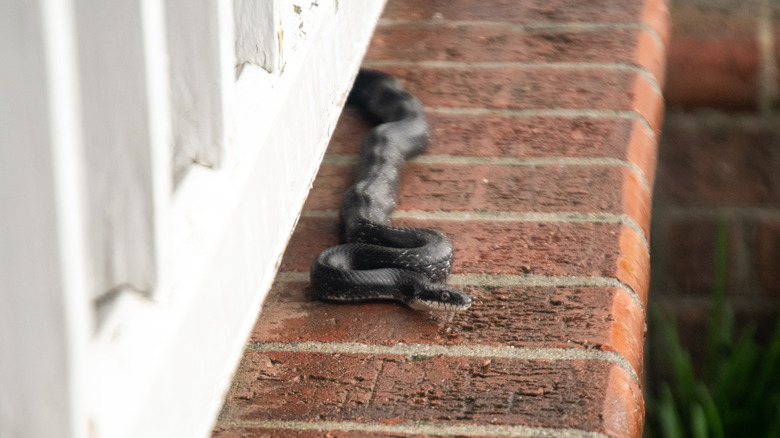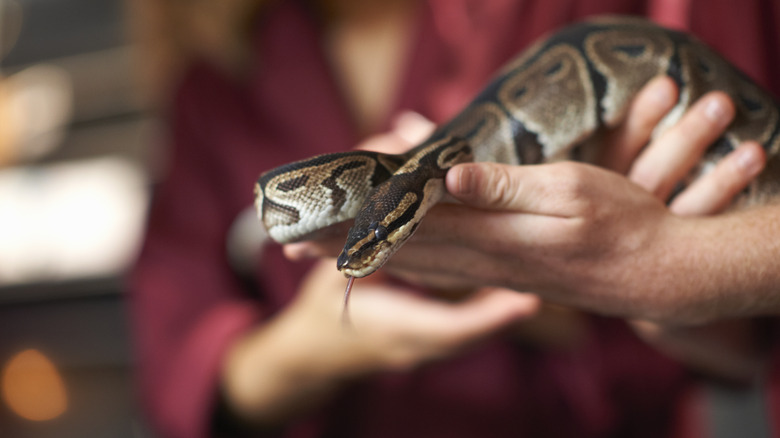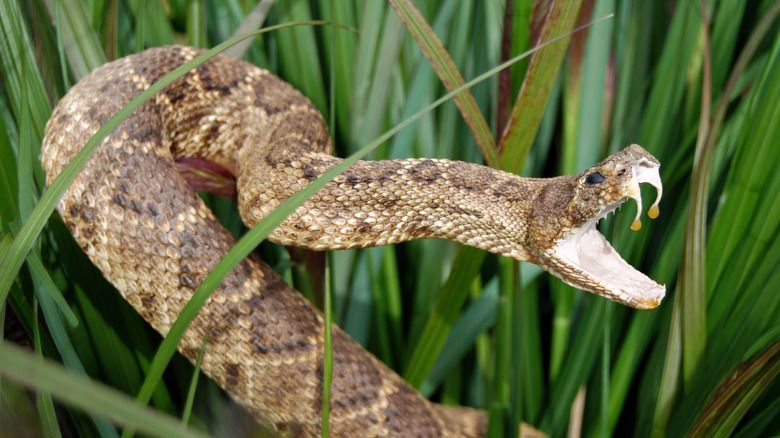The Unexpected Behavior That Leads To Countless Snakebites
Many people harbor a natural curiosity about snakes, often leading to unintended interactions that can result in snakebites. While snakes generally prefer to avoid human contact, certain behaviors can provoke them into defensive actions. For example, stumbling upon a snake while hiking or gardening can lead to a close encounter. Instead of retreating, some individuals might approach the snake out of curiosity or the desire to capture it. This curiosity-driven behavior is a significant factor in the frequency of snakebites.
According to Jay Brewer, host of Roku's "Reptile Royalty," most snakebites are a far cry from random attacks on the hiking trail. Speaking exclusively to Outdoor Guide, the founder of The Reptile Zoo broke down how negligence often comes into play. "Most people [who] get bitten are messing with that snake. They're throwing rocks at it. They think they killed it, they pick it up, and the head still bites them," Brewer explains. "Or they cut the head off with a shovel, and they think it's fun ... and they play with it, and [the] head bites them."
Understanding this initial step of curious interaction is crucial for preventing bites. Recognizing a snake's desire to be left alone can help reduce the risk of these dangerous encounters. The key to avoiding bites lies in respecting the snake's space and being aware of the natural tendencies that drive humans to approach these reptiles. Thus, fostering a respectful distance from snakes can significantly reduce bite incidents.
Misguided attempts at handling
The problem escalates when curiosity transforms into an attempt to handle or kill the snake. This often involves risky behaviors like picking up the snake. Jay Brewer warns of multiple scenarios, explaining, "[People are] carrying it, and it swings around, or they're just trying to be crazy and catch it alive." People sometimes find amusement in playing with a decapitated snake head, unaware that it can still deliver a venomous bite.
This misguided bravado stems from a lack of understanding of the snake's physiology and capabilities. Moreover, snakes have powerful reflexes that allow them to strike up to an hour after they've been mortally wounded. "The fangs ... can bite you through their own lip, so it's really not a good animal to play with," cautions Brewer. This makes it incredibly easy for snakes to bite unsuspecting handlers. These behaviors not only endanger the individuals involved but also contribute to the snake's defensive and aggressive responses.
Fear and ignorance leading to mistakes
Fear and ignorance often exacerbate the risk of snakebites. When people encounter snakes, their immediate reaction is typically one of fear, leading to panic and poor decision-making. Jay Brewer emphasizes that being scared of snakes can be more dangerous than being educated about them. "When you're scared, you make mistakes, you trip, you fall, you run, you get a shovel, [and] like I said ... try to kill it, and you end up in the hospital," Brewer warns. This fear-induced reaction can cause individuals to act impulsively, which increases the likelihood of getting bitten. One other key thing to know is the most common places you might find snakes in your yard, so you can stay clear of them all together.
By learning to identify different snake species and understanding their behavior, people can react more calmly and appropriately when they encounter a snake. As Brewer perfectly puts it, "It's more dangerous to be scared of them than to be educated of them because if you're educated, then [you know], 'Oh, I know that kind of snake, and I'm going to steer clear from it.'" Overcoming fear through education is key to reducing snakebite incidents and promoting safer interactions with these often misunderstood reptiles.
To learn more about reptiles from Jay Brewer and his team, watch Season 2 of "Reptile Royalty," now streaming on The Roku Channel.


